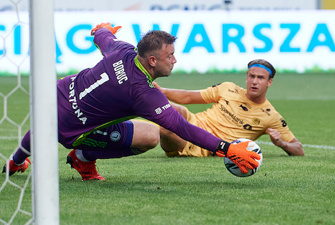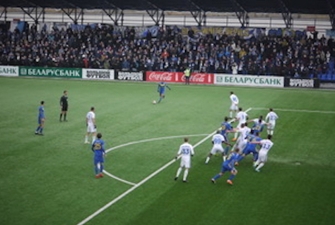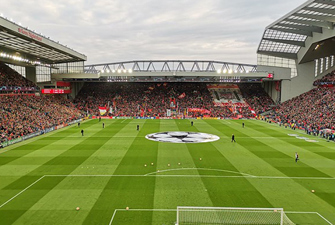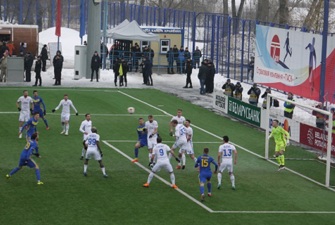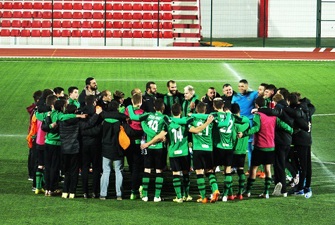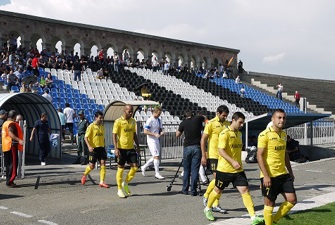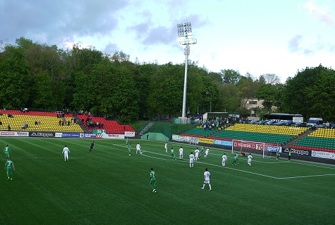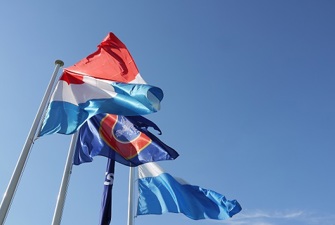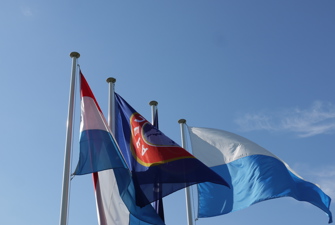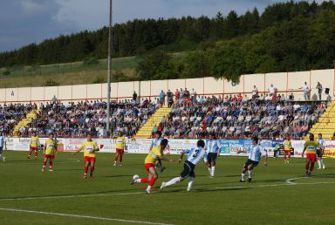More new clubs but domestic hegemonies continue - Champions League Diversity Index 2017/18
While there is a higher number of new entrants in this season's Champions League, the 'Big Five' leagues still dominate the tournament, this season's Diversity Index shows.
The largest number of new clubs for seven years will feature in the 2017/18 Champions League. (See Figure 1)
A dozen clubs will make their debut in the forthcoming season according to Play the Game’s latest Champions League Diversity Index.
New names range from major European leagues, such as the Bundesliga, where RB Leipzig and Hoffenheim have qualified, to the tiny British enclave of Gibraltar, whose champions, Europa, make their debut in the forthcoming season.
Figure 1. New Champions League entrants
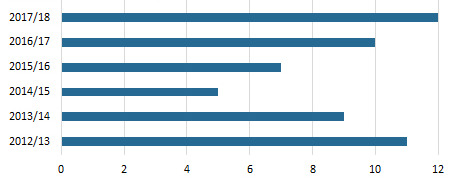
Other new entrants include Istanbul Basaksehir (Turkey), FCI Tallin (Estonia), Kukesi (Albania), Romania’s Viitorul Constanta, who were only founded in 2009, and Spartaks Jurmala (Latvia).
Vikingur Gota from the Faroe Islands take their Champions League bow in the 2017/18 qualifiers alongside IFK Mariehamm from Finland and Georgia’s Samtredia, who both feature for the first time. Hungarian champions Honved played in the old European Cup but have not taken part in the Champions League since the 1994/95 restructuring, which paved the way for the current format.
15 year run of titles broken
Part of the reason for the increase in new clubs is the inclusion for the first time of Gibraltar, where Lincoln Red Imps were unable to win the domestic title for the first time since 2001/02. Instead, Europa won out with a squad who were virtually all from across the border in neighbouring Spain.
Another of Europe’s longest running hegemonies was also broken in 2016/17, when Rijeka displaced Dinamo Zagreb as Croatian champions for the first time since 2004/05. However, Rijeka appeared in the 1999/00 Champions League qualifiers after finishing in second in the Croatian league and taking one of the two places then on offer to the Balkan country.
Only three clubs – Dinamo Zagreb, Rijeka and Hadjuk Split – have represented Croatia in the Champions League since 1994/95 and the country is ranked the third least diverse UEFA member in Play the Game’s index, which works by dividing the total number places on offer by the amount of clubs taking part.
The least diverse UEFA member is Greece, where Olympiacos have won the last seven domestic titles and 19 of the last 21. The 46 Champions League slots on offer to Greece since 1994/95 have gone to Olympiacos, Panathaniakos, PAOK or AEK, who return for the first time in a decade in 2017/18.
Domestic dominance continues
Hegemonies continue to prevail in many parts of Europe, even in those countries that will benefit from the controversial changes to the Champions League to be introduced by UEFA.
From 2018, the top four teams from the four highest-ranked associations will go straight to the group stages and this will benefit the Bundesliga, where Bayern Munich won the title for a record fifth season in a row in 2016/17.
However, 14 different clubs have represented Germany in the competition since 1994/95, which is the most diverse representation in the Play the Game index.
More of the same
Outside of the Big Five major leagues, there is even greater dominance with Benfica, Porto and Sporting dominating Portugal’s places in the competition since 2014/15.
Celtic take Scotland’s place for a sixth season in a row after winning the Scottish Premiership without losing a game in 2016/17, while Basel have won the Swiss Premier League for the last eight seasons.
Ludogrets and TNS won the Bulgarian and Welsh titles respectively for a sixth straight season in 2016/17, when APOEL became Cypriot champions for a fifth successive time.
Zalgiris won a fourth successive Lithuanian league in 2016/17 and Dundalk were the champions of the Republic of Ireland for a third year in a row, but the biggest domination remains in Belarus, where BATE Borisov have won the last 11 titles.
Overall, the number of countries represented by the same clubs as the previous season has risen from 22 in 2015/16 to 23 last season and 24 in 2017/18.
Less diversity
The Diversity Index tracks how often the same clubs keep appearing in the Champions League and whether the competition is slowly morphing into a European Super League by default.
While the number of new teams taking part will rise in 2017/18, these clubs all come from outside of the Big Five leagues, which dominate European football to an extent one could argue is increasingly unhealthy.
While 12 different clubs have represented Spain since 1994/95, the four La Liga sides due to take part in 2017/18 – Real Madrid, Barcelona, Athletico Madrid and Seville – have all entered the Champions League for the last three seasons.
In Italy, where Juventus have won the last six Serie A titles, the same three clubs as 2016/17 will again take part in the forthcoming season.
This dominance extends to knockout stages of the Champions League, with the semi-finalists coming from England, France, Germany, Italy and Spain for the last 12 seasons.
Not since PSV Eindhoven in 2004/05 has there been a Champions League semi-finalists from outside the Big Five.
Note:Trepca ’89 from Kosovo are due to take part in the 2017/18 Champions League qualifiers, but Kosovo are not included in the index because this will be the first participation by a Kosovar club.

